International University Exchange Programme for Young Engineers 2009
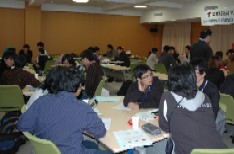
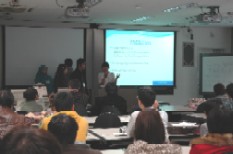
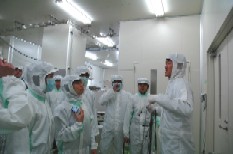
- Theme of Programme
-
International University Exchange Programme for Young Engineers
-Possibilities of ICT (Information and Communication Technology) for the environmental problems - - Background
- Toyohashi University of Technology (TUT) has been organizing international exchanging activities since the foundation of the university through ODA projects in ASEAN countries. TUT has also conducted student exchange programme with universities in Indonesia since 2003. This student exchange programme provides students with opportunities to expose them to international academic atmosphere as well as to learn English communication skills and the role of engineers.
- Programme Duration
- From 24th November to 30th November, 2009
- Venue
- Toyohashi University of Technology (TUT), Toyohashi, Japan
- Objective of the Programme
-
This year's programme offers a number of activities including lectures, a workshop, an industrial visit, home stays and other cultural activities.
International University Exchange Programme for Young Engineers 2009 is hosted by Toyohashi University of Technology and invites students and academics from Indonesia and Vietnam. This year programme focuses on Possibilities of ICT (Information and Communication Technology) for the environmental problems. Therefore, participants will engage in an multicultural dialogue, facilitating the exchange of ideas about the role of science and technology and ICT in particular in promoting sustainable societies. The diversity of the participants also facilitates the discussion of social and cultural factors in these socio-technical areas. - Participating Universities
-
Toyohashi University of Technology (TUT)
Institute of Technology Bandung (ITB)
College of Technology, Vietnam National University, Hanoi
Madania Progressive Indonesian School - Main activities
-
- Student seminar on Possibilities of ICT (Information and Communication Technology) for the environmental problems
- Laboratory visit in TUT
- Factory and Cultural visits in Nagoya, Japan
- Lectures and workshop activities
- Student participation
-
Students had a preparation period in which they reviewed basics about the environment and ICT before coming to Japan. This preparation was an important factor in order to get an active participation along the programme and particularly during the two lectures and the workshop.
Students were organized into groups of four to six students who exchanged ideas in order to understand the nature and impact of environmental problems and to provide possible solutions. Each group was assigned one specific environmental problem.
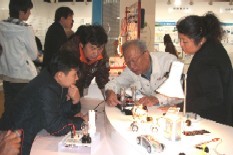
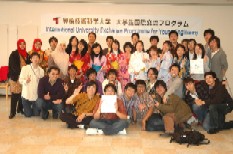
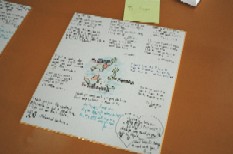
- Schedule
-
- Nov.23
- Arrival at Chubu Intfl Airport
- Nov.24
- Opening Ceremony and Self Introduction of Participants
Keynote lecture by Prof. Dr. Yoshiteru ISHIDA, Dept. of Knowledge-based Information Eng.
Keynote lecture by Assoc. Prof. Dr. Naohiro GOTO, Dept. of Ecological Eng.
Group Discussion
Welcome Party at Hibari Lounge in TUT - Nov.25
- Group Discussion
TUT Labo tour - Nov.26
-
Workshop led by Assoc. Prof. Dr. Rafael Batres
Group discussion and Preparation for the presentation - Nov.27
- Presentation
Leave Toyohashi for Nagoya by bus - Nov.28
- Visit Toyota Commemorative Museum of Industry and Technology
Visit Aichi-Rinku New Energy Research Area
Arrival at Toyohashi
¨Students from overseas participated in Home stay Program - Nov.30
- Visit VBL (Venture Business Laboratory)
Closing Ceremony
Farewell Party - Dec.1
- Leave Japan for Jakarta or Hanoi
Thank you for participating in the International Exchange Programme for Young Engineers.
Please answer the questionnaires to improve the programme.
For TUT students, you need to answer the 2 kinds of questionnaires.
You can download the sheet as below:
After you answer the questionnaires, please send it back to us by PDF file.
Evaluation sheet (English): for all the participants
Evaluation sheet (Japanese): only for TUT participants
| Submit to | International Affairs Division of TUT |
| kouryu@office.tut.ac.jp | |
| Deadline | December 25, 2009 |
- Period
From November 24, 2009 to November 30, 2009
- Venue
- Theme
Possibilities of ICT (Information and Communication Technology) for the environmental problems
- Schedule
1 Purpose
This programme aims at providing the future engineers the opportunity to learn and discuss issues related to technology, environment, society, and ethics in a global context to help students work more effectively in an world without borders. This programme brings together students and academics from different countries.
2 Programme outline
The programme offers a number of activities including lectures, a workshop, an industrial visit, home stays and other cultural acitivites. International University Exchange Programme for Young Engineers 2009 is hosted by Toyohashi University of Technology and invites students and academics from Indonesia and Vietnam. This year programme focuses on Possibilities of ICT (Information and Communication Technology) for the environmental problems. Therefore, participants will engage in an intercultural dialogue and the exchange of ideas about the role of science and technology and ICT in particular in promoting sustainable societies. The diversity of the participants also facilitates the discussion of social and cultural factors in these socio-technical areas.
3 Lectures and workshop activities
Lectures and workshop activities will be held on Tuesday and Thursday. Student participation will be coordinated in all these events. On Friday, students will present their views and conclusions they developed during the week.
| Lecture / Workshop Title | Speaker |
| Information and Communication Technology (ICT) for the environment, by the environment, with the environment | Yoshiteru Ishida (Professor of Knowledge-based Information Engineering) |
| Japanese cases to establish the Sound Material-Cycle Society | Naohiro Goto (Associate Professor in the department of Ecological Engineering) |
| Moral responsibility in the era of computers and new technologies | Rafael Batres (Associate Professor in the department of Production Systems Engineering) |
4 Student participation
Students will have a preparation period in which they review basics about the environment and ICT before coming to Japan. This preparation is required in order to get an active participation along the programme and particularly during the two lectures and the workshop.
After the lectures, students will be organized into groups of four to six students who will exchange ideas in order to understand the nature and impact of environmental problems and to provide possible solutions. Each participant is required to select three environmental problems from the list below and submit this selection to the organizers. The organizers will do their best in accommodating the participants into groups that meet their interests.
Below is the list of environmental problems and a number of support materials hosted by Japanese agencies. The participants are free to use similar resources provided by their local institutions.
Environmental problems
- 1. Climate change
Carbon dioxide, Global warming
http://www.env.go.jp/earth/ondanka/knowledge.html
http://www.env.go.jp/en/earth/- 2. Energy
Fossil fuel, Natural energy, Eco-car, Energy saving, biomass
http://www.enecho.meti.go.jp/
http://www.meti.go.jp/english/policy/energy_environment/index.html
http://www.enecho.meti.go.jp/english/index.htm- 3. Solid waste
Recycle, International waste transfer
http://www.env.go.jp/recycle/
http://www.env.go.jp/en/recycle- 4. Chemical substance
Human health, Pesticide, Food contamination
http://www.env.go.jp/chemi/
http://www.env.go.jp/en/chemi/- 5. Ozone layer depletion
Fluorocarbon, Montreal protocol
http://www.env.go.jp/earth/ozone/ozone.html
http://www.env.go.jp/en/earth/- 6. Bio diversity
Bio-resource
http://www.cop10.jp/aichi-nagoya/
http://www.biodic.go.jp/biodiversity/
http://www.cop10.jp/aichi-nagoya/english/index.html
http://www.env.go.jp/en/nature/- 7. Sustainable society
Sustainable development, 3R
http://www.env.go.jp/recycle/
http://www.meti.go.jp/policy/energy_environment/shigenjunkan/index.html
http://www.env.go.jp/en/recycle/
http://www.meti.go.jp/english/policy/energy_environment/index.html- 8. Water Pollution
- 9. Air Pollution
